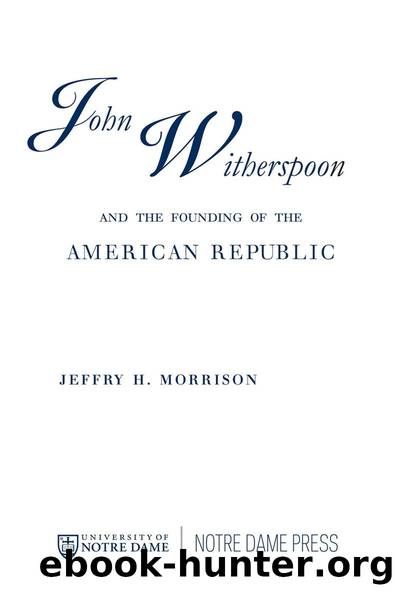John Witherspoon and the Founding of the American Republic by Jeffry H. Morrison

Author:Jeffry H. Morrison [Morrison, Jeffry H.]
Language: eng
Format: epub
Tags: History, United States, Revolutionary Period (1775-1800), Colonial Period (1600-1775), Political Science, History & Theory
ISBN: 9780268087227
Google: w5cFDgAAQBAJ
Publisher: University of Notre Dame Pess
Published: 2003-01-27T01:42:06+00:00
The Presbyterian Constitution of 1787
Witherspoonâs energetic role in the nationalization of the Presbyterian Church in the United Statesâhe drafted the Introduction to its national constitution and was elected the first Moderator (the ecclesiastical equivalent of president) of the newly created General Assemblyâprovides an interesting corollary to his pro-federal Constitution stand and is an indicator of his desire for the formation of a new nation. Witherspoon understood that the mere formal arrangements of government were not enough to hold together a body politic. Habits of thinking, speaking,65âlike Noah Webster, Witherspoon was fascinated by the effect of language on national characterâand even worship had to be cultivated. In effect, a national conscience needed to be developed, and the strengthening of the Presbyterian church could be an essential factor in that development. During the War, Witherspoon lamented that while the fact of independence seemed imminent, âwe have not yet acquired the whole ideas and habits of independence.â66 If, as some historians insist, â[r]eligion was one of the more potent factors in the making of the United States of America,â and not merely in the creation of certain political documents but also in the unifying of a âfree people held together by ties such as ⦠language, religion, manners and customs,â67 then Witherspoonâs role in the nationalization of the Presbyterian church is worth emphasizing. Examining the form of government outlined in the Presbyterian constitution also provides evidence of his position in the New Jersey ratifying convention.
The unification of the Presbyterian Church in the United States and the subsequent drafting of its constitution were events of no small significance in the nationalization of America. Edward Humphrey has written that â[w]e cannot but repeat that the centralized governing body of the Presbyterian Church in America during the colonial period, the Synod of New York and Philadelphia, was the most influential of all colonial institutions towards the development of a centralized national conscience.â68 The activities of the Synod of New York and Philadelphia, which culminated in the writing of the Presbyterian constitution in 1787, not only helped heal the breach between two rival groups within the denomination (Old Side and New Light), but they also created a constitution that was curiously similar, as we will see, to the one produced at the same time by the Federal Convention.69
When they set about to affirm a confession of faith as the first document within their constitution, the Synod quite naturally turned to the Westminster Confession of Faith of 1647. On the whole they reaffirmed the Westminster Confession verbatim, yet with one notable exception. Article III of Chapter XXIII of the 1647 Confession dealt with the rights and responsibilities of the civil magistrate concerning the proper worship of God by the churches. The Americans made substantial changes to this article, severely limiting the magistrateâs power to interfere in church government to reflect their greater degree of distinctness between church and state. The original article from 1647 read as follows:
III. The civil magistrate may not assume to himself the administration of
Download
This site does not store any files on its server. We only index and link to content provided by other sites. Please contact the content providers to delete copyright contents if any and email us, we'll remove relevant links or contents immediately.
Waking Up in Heaven: A True Story of Brokenness, Heaven, and Life Again by McVea Crystal & Tresniowski Alex(37786)
Empire of the Sikhs by Patwant Singh(23072)
We're Going to Need More Wine by Gabrielle Union(19034)
Hans Sturm: A Soldier's Odyssey on the Eastern Front by Gordon Williamson(18572)
Leonardo da Vinci by Walter Isaacson(13316)
The Radium Girls by Kate Moore(12018)
Tools of Titans by Timothy Ferriss(8365)
Educated by Tara Westover(8045)
How to Be a Bawse: A Guide to Conquering Life by Lilly Singh(7471)
Permanent Record by Edward Snowden(5838)
The Last Black Unicorn by Tiffany Haddish(5629)
The Rise and Fall of Senator Joe McCarthy by James Cross Giblin(5274)
Promise Me, Dad by Joe Biden(5141)
The Wind in My Hair by Masih Alinejad(5091)
A Higher Loyalty: Truth, Lies, and Leadership by James Comey(4954)
The Crown by Robert Lacey(4806)
The Iron Duke by The Iron Duke(4349)
Joan of Arc by Mary Gordon(4100)
Stalin by Stephen Kotkin(3957)
